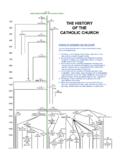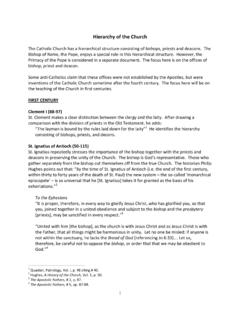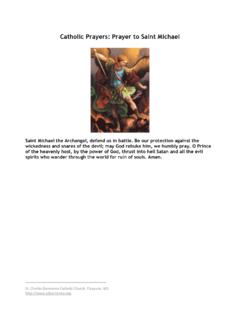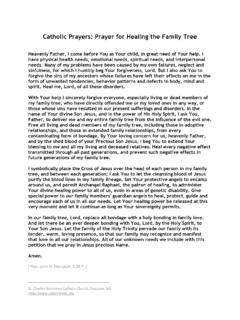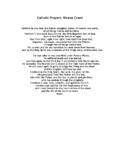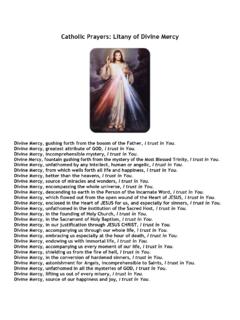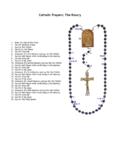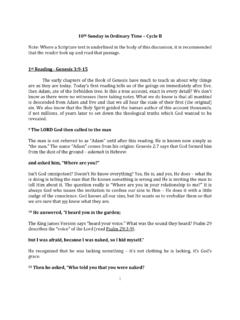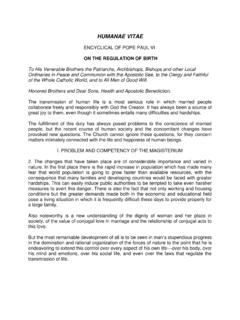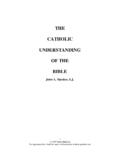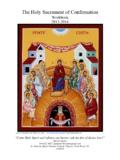Transcription of Understanding Lent - Saint Charles Borromeo …
1 1 Understanding lent Although the celebration of lent began in the catholic Church, it is not exclusively a catholic practice. For example, it is common for Methodists, Episcopalians, Presbyterians, Orthodox, Lutherans and others to celebrate lent in some form. The word lent was originally a Teutonic word that meant the spring season. During the Anglo-Saxon era it was the term used to translate the Latin word quadragesima, meaning the "forty days," or more literally the "fortieth day." During the first three centuries of the Christian era there were great variances in the fasting observance before Easter.
2 Writing to Pope Victor near the end of the second century, St. Irenaeus observed: some think they ought to fast for one day, others for two days, and others even for several, while others reckon forty hours both of day and night to their fast. In his Festal Letters (331 ) St. Athanasius enjoined his flock to fast for forty days preliminary to, but not inclusive of, the stricter fast of Holy Week. Subsequently, in 339 he wrote in the strongest terms to urge this observance upon the people of Alexandria because the forty days fast was universally practiced.
3 In the time of Pope Gregory the Great (590-604) the fasting at Rome during lent lasted six days excluding Sunday during the six weeks before Easter, making thirty-six fast days in all. At a later date the wish to realize the exact number of forty days led to the present practice of beginning lent on Ash Wednesday. The Lenten season in the catholic Church is connected with Jesus temptations after a forty-day fast when he undid the infidelity of the first Adam. Adam was called to be a priest, a prophet, and a king.
4 As a priest he was called to be a conduit and protector of life. He was a conduit of life as a biological and spiritual father. God commanded Adam to cultivate and care for the garden of Eden (Gen 2:15) just before He gave Adam the command not to eat of the tree of knowledge of good and evil (Gen 2:17). The translation care is a weak rendering of the Hebrew word shamar, which means to guard or defend. This command conveys two ideas. First, it indicates there is an external threat. Second, it implies there is something in Eden that is valuable.
5 In the context of God s command and the aftermath, it is clear that Adam s soul and the soul of his bride were the precious objects that needed defending. As a prophet, Adam was called to be a conduit of truth. He is charged with communicating God s command to Eve. Finally, as a king Adam was called to lovingly serve his wife and their future children. He would accomplish this through the cultivation of natural creation and as the spiritual leader of his family. Eve compliments Adam in his three-fold office as mother, prophetess, and queen.
6 As the biological mother of the living Eve was uniquely a conduit of life. As a 2 prophetess Eve shared in the spiritual formation of her children for she was also called to be a conduit of truth. Also as the one loved, the heart of the family, Eve was called to model how men and women respond faithfully to God, the heavenly husband. Finally, as a queen Eve was called to a life of service, and to assist her husband as the spiritual leader in the family. In the third chapter of Genesis the devil seduces Adam and Eve into sin.
7 He says to the woman: You certainly will not die [He both lies and contradicts God.]! No, God knows well that the moment you eat of it your eyes will be opened and you will be like gods who know what is good and what is bad (Gen 3:4-5). This is the critical point in the temptation because the devil questions the heavenly Father s love. He is saying in effect: God does not love you. He is holding back the gift of love and life because he is selfishly trying to protect his privileged position. He knows that when you eat of the fruit of the knowledge of good and evil, you will be like him making your own rules.
8 Then you will determine what is right and wrong. Don t trust God. So, if you want to be free, be like me and take it. Tragically, the guard Adam is silent. When the devil questioned the Father s love and integrity, Adam should have spoken out: Hollowed be His name. When they were tempted to set up a reign in opposition to God, she should have proclaimed: His kingdom come, and His will be done on earth as it is in heaven. When the devil tried to seduce Eve to deny God s gift of life and love, Adam should have asserted: The good Father will give us hour daily bread, we don t have to take it.
9 Finally, in his confrontation with the anti-Word, Adam should have cried out to the Father: Lead us not into temptation, but deliver us from the evil one. The Lord s Prayer is not merely a beautiful prayer that Jesus taught, but a synopsis of the life he lived. No wonder the Catechism calls it the summary of the whole gospel (CCC # 2700). Because there was no challenge to the devil s beguiling lies Eve s focus was fixed on the deception. The Bible simply tells us: The woman saw that the tree was: 1) good for food, that is, capable of giving pleasure, 2) pleasing to the eyes, therefore alluring to possess, and 3) desirable for gaining wisdom, that is, enticing to give power, So she took some of its fruit and ate it (Gen 2:6).
10 Eve didn t bite into an apple, she bit into the lie that she could short-cut the road to happiness by doing things her way, according to her ideas. This is a deception that many, many bite into today. Notice what captivated her imagination: pleasure, possessions, and power. St. John addressed these alluring dangers in his first letter: Do not love the world or the things of the world. If anyone loves the world, the love of the Father is not in him. For all that is in the world, [1] sensual lust, [2] enticement for the eyes, and a [3] pretentious life, is not from the Father but from the world (1 Jn 2:15-16).
